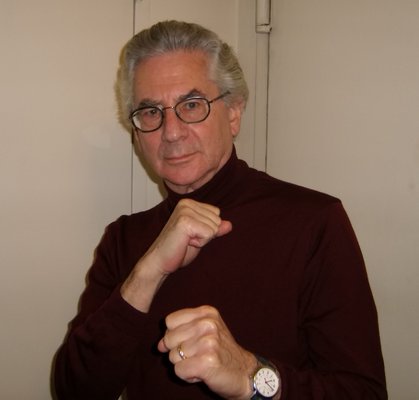
Sometimes, an author’s inspiration to write a book comes from past experiences. For author Jeffrey Sussman this is especially true.
In his latest book, “Max Baer and Barney Ross: Jewish Heroes of Boxing,” Mr. Sussman takes readers into the world of boxing during the 1920s and ’30s at the height of anti-Semitism in America. The book, released earlier this month, is his 11th nonfiction book.
The story dives into the lives of Max Baer and Barney Ross, two prominent Jewish boxers during the Great Depression. As anti-Semitism became a growing issue in America, the Jewish community saw boxing as a chance to stand up, and Mr. Baer and Mr. Ross offered Jewish-Americans the symbols of hope they desperately needed.
Mr. Sussman’s personal experience with boxing began when he was just 12 years old.
“As a child, I was skinny and short. My father was concerned that bigger boys at school would pick on me,” Mr. Sussman said. “One day he brought home a pair of boxing gloves, a jump rope, a punching bag, and assembled them in the basement of our home and gave me boxing lessons.”
This was only the beginning. As Mr. Sussman began to learn the elements of boxing his father had begun to chronicle the many stories he had as a kid growing up during the Golden Age of boxing.
“My father grew up in a combination of German and Jewish neighborhoods in Queens. It was during the rise of fascism. There were a lot of people who were anti-Semitic in his neighborhood,” Mr. Sussman said. “My father used to get into fistfights with them almost every day and he learned to defend himself and thought it was important to do that.”
His father grew up in a town known as Richmond Hill on the southwest outskirts of Queens. He befriended a man named Abe Simon who would eventually become a heavyweight boxer in the 1940s.
“Boxing was the most popular sport in America next to baseball up until the end of World War II,” Mr. Sussman said. He noted that a championship boxer could make more money in one fight than Babe Ruth could make in an entire season.
After learning the basics of boxing, his father signed him up for 10 boxing lessons at a famous gym in Manhattan known as Stillman’s.
“It infused me with a self confidence that I could defend myself if anyone wanted to pick on me. Hearing these kind of stories and getting boxing lesson made me very interested in boxing,” Mr. Sussman said.
In the 1980s, Mr. Sussman worked for a public relations agency in Manhattan. It was here where he got to promote his first fighter, an Olympic gold medalist by the name of Howard Davis.
“I used to go watch him train at a gym on West 42nd Street called the Times Square Gym. I was fascinated by how clever he was in the way he avoided being hit and was able to win bouts with remarkably little damage to himself,” Mr. Sussman said.
Over the past decade, Mr. Sussman expanded his writing onto Boxing.com, where he’s written more than a dozen articles and a few short stories. After years of research into multiple boxers, he set his sights on Mr. Baer, who became a champion not only in the sport of boxing but in the eyes of the Jewish community in America.
“I became fascinated by Max Baer because he had fought Hitler’s favorite boxer, Max Schmelling, in 1933,” Mr. Sussman said.
Highlighted in the book, the bout took place at Yankee Stadium with a crowd of more than 30,000 fans in attendance. Mr. Sussman recounted how his father, a regional salesman for a dairy company at the time, received tickets to the fight because he was Jewish. Also in attendance were a large number of pro-German and pro-Nazi fans cheering on Mr. Schmelling to win.
“It was a very intense scene. Max Baer, who was only part Jewish, nevertheless wore a Star of David on his boxing trunks and his manager, who was Jewish, told him that Schmelling represented the Nazis. It kind of fired up Max Baer, who tended to be a lethargically lazy fighter but was extremely intense that night and pummeled Schmelling,” Mr. Sussman said. “The gate for the fight at Yankee Stadium was almost a million dollars, which was an extraordinary amount for 1933 during the height of the Depression.”
Mr. Sussman currently lives in Manhattan, where he is the president of an eponymous marketing public relations firm. He also owns a home in East Hampton, where he spends most of his weekends, and extended time during the summer.
Boxing has become a true passion of Mr. Sussman and he continues to write about the sport with another book, a biography of middleweight fighter Rocky Graziano, in the works.
Jeffrey Sussman will discuss “Max Baer and Barney Ross” on Saturday, December 3, at East Hampton Library. To reserve a seat, visit the adult reference desk, call 631-324-0222, extension 3, or go to easthamptonlibrary.org.